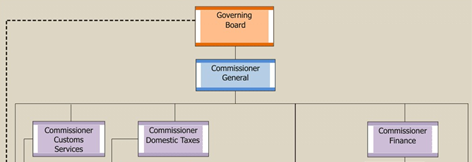Southern African Development Community (SADC)
The Southern African Development Coordinating Conference (SADCC), established on 1 April 1980, was the precursor of the Southern African Development Community (SADC). The SADCC was transformed into the SADC on 17 August 1992 in Windhoek, Namibia where the SADC Treaty was adopted, redefining the basis of cooperation among Member States from a loose association into a legally binding arrangement. The main objectives of SADC are to achieve development, peace and security, and economic growth, to alleviate poverty, enhance the standard and quality of life of the peoples of Southern Africa, and support the socially disadvantaged through regional integration, built on democratic principles and equitable and sustainable development.
Zambia Revenue Authority (ZRA)
The role of the Zambia Revenue Authority Governing Board is derived from the Zambia Revenue Authority Act 321, Section 11 (1), (2) and (3). According to the Act, the responsibilities of the Governing Board are:
- To oversee the organization and administration of the Authority and management of its resources, services, property, and personnel and
- To develop the corporate strategic plan and such other administrative policies as are necessary for the smooth running of the Authority.
The Commissioner General, who is appointed by the Republican President, is assisted by Senior Management Members (SMM). The Commissioner General is responsible for the day to day running of the Authority’s business under the direction of the Governing Board.
The Authority has two operating divisions which are Customs Services Division and Domestic Taxes Division. The organizational structure is as per the following diagram:

Website: http://www.zra.org.zm/
The environment in which ZRA operates, both domestically and internationally has changed and keeps changing. While economic development and macroeconomic stability is stronger, tax collections which peaked in terms of GDP several years ago have been declining. Equally, international trade has grown, but with a lower contribution to revenues due to expanding free trade agreements. As such, a review and possible overhaul of tax policies are imminent.
Food and Drugs Control Laboratory (FDCL)
The FDCL is a unit within the Ministry of Health in the directorate of Disease Surveillance Control Research. The mandate of FDCL is to protect the public against hazards and fraud in the sale and use of foods, drugs, water and to ensure that the foods, drugs and water consumed in Zambia conform to the Food and Drugs regulations of 2001 and World Health Organisation (WHO) standards. Quality Assurance: The Laboratory has implemented ISO 17025:2005 quality management system as its operating tool and participates in SADC (regional) Laboratory proficiency tests to ensure that results produced by the laboratory meet both national and international requirements. All the equipment used in the analysis of the samples are calibrated/serviced by qualified bodies such as the Zambia Bureau of Standards.
Website: http://www.fdcl.org.zm/
Zambian Medicines Regulatory Authority (ZAMRA)
ZAMRA, formally the Pharmaceutical Regulatory Authority, is the Statutory National Medicines Regulatory Body for Zambia established under an Act of Parliament, the Medicines and Allied Substances Act No. 3 of 2013 of the Laws of Zambia to regulate and control the manufacture, importation, storage distribution, supply, sale and use of medicines and allied substances. The main objective of the Authority is to ensure that all medicines and allied substances being made available to the Zambian people consistently meet the set standards of quality, safety and efficacy.
Website: http://www.zamra.co.zm/
Zambia Compulsory Standards Agency (ZCSA)
The Zambia Compulsory Standards Agency (ZCSA) was established to administer, maintain and ensure compliance to compulsory standards. This is aimed at ensuring public health, safety and protection of the environment are maintained. Through its mandate the ZCSA facilitates growth of trade and the manufacturing industry in Zambia. The Agency started operations on 1st January 2018 and has been conducting activities aimed at fully operationalizing the Agency’s mandate, following the implementation of the National Quality Policy.
The ZCSA supports industrial growth through inspections and approval of products regulated by means of compulsory standards. Inspections are conducted so that products which are sold or imported onto the local market and those which are exported adhere to standards. These inspections are done through the Agency’s Import Quality Monitoring and Domestic Quality Monitoring departments. This, therefore, protects Zambian industry against unfair technical barriers to trade and competition; and this is done in collaboration with other Government agencies.
Website: https://www.zcsa.org.zm/
Zambia Bureau of Standards (ZABS)
Over the years ZABS has carried on its role of developing standards and providing conformity assessment services to industry. With the realignment of the National Quality Infrastructure (NQI) in 2018, to international best practices, ZABS role is now more focused towards supporting industry to implement standards that enhance the quality of products and services for industry growth and competitiveness.
Website: https://www.zabs.org.zm/
For more information on regulatory departments and quality control laboratories’ contact details, please see the following links: 4.1 Zambia Government Contact List and 4.3 Zambia Laboratory and Quality Testing Companies Contact List.


